Dentures – Chaska, MN
Filling In Your Smile’s Gaps
A smile marred by multiple missing teeth or an entire arch can cause many problems for a person. In addition to making them feel extremely self-conscious, it can also have a drastic impact on their oral health. Often, if any remaining teeth exist, they will shift into the open spaces, causing them to crowd and appear crooked. Plus, the exposed gum tissue is much more likely to become infected, and this can lead to even more lost teeth. Fortunately, the team at Chaska Dental Center has a solution that not only gives someone their complete smile back but protects their oral health as well: full and partial dentures. Call us today to find out how you can get started.
Why Choose Chaska Dental Center for Dentures?
- State-of-the-Art Dental Technology for Enhanced Treatment Planning
- Traditional & Implant-Supported Dentures Available
- Most Dental Insurance Plans Accepted
Who’s a Good Candidate for Dentures?

Determining if you are a good candidate for dentures requires a thorough consultation by a qualified dentist, Dr. Swingdorf. During this visit, he will examine your smile and take digital images of your existing teeth and gum tissue. If any existing problems of tooth decay or gum disease exist, it will be essential to address and treat these problems first.
Effects of Missing Teeth
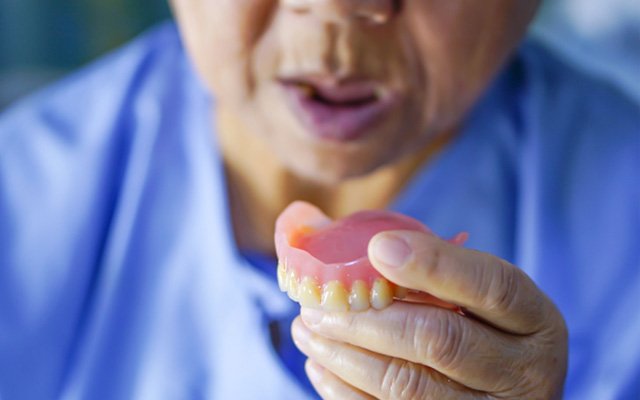
The struggle many patients face when living with missing teeth is the inability to eat certain foods as well as speak clearly. The aesthetic toll it takes is also another common complaint, as this not only affects a person physically but also mentally and emotionally.
This breakdown of self-esteem can lead to depression and other serious problems that can manifest throughout the mouth and body. If tooth loss remains untreated, it will only spur additional teeth to become loose as well as bone resorption, which eventually leads to complete tooth loss.
What Qualifies You for Dentures?
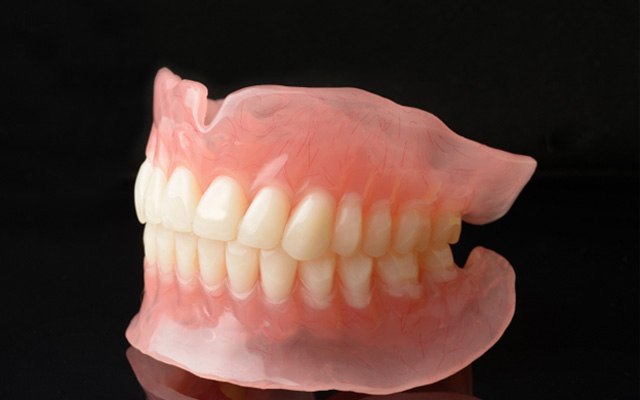
While most adults with missing teeth are considered candidates for dentures, it’s imperative that Dr. Swingdorf and our team evaluate the status of your current smile to determine if any additional treatments are required.
For example, you may need a bone graft to fully support a denture that is held into place by dental implants. You may have signs of gingivitis that need to be addressed with scaling and root planing before having a custom denture created and resting on top of your gums.
Our team will determine how best to move forward so that whether you receive dentures now or later, you can expect beautiful results in the end.
Alternative Tooth-Replacement Options
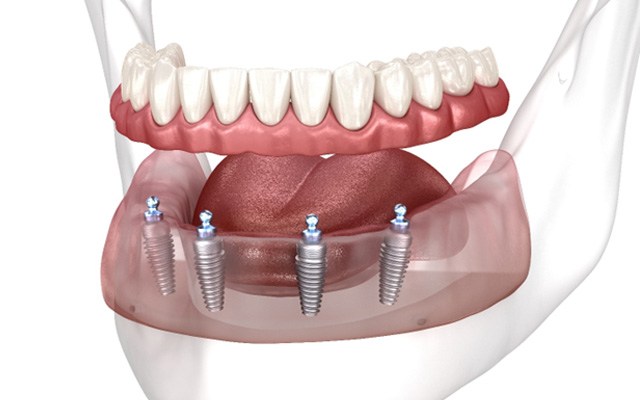
Full and partial dentures are time-tested prosthetics that have helped and continue to help individuals embrace better oral health and more confident smiles. But if you prefer another option for replacing your missing teeth, we have two solutions to choose from – dental bridges and dental implants.
- Dental Bridges – If multiple consecutive teeth are missing on the lower or upper arch, we can craft a fixed dental bridge from two dental crowns and free-standing pontics. Referred to as artificial teeth, they rest on top of the gums, while the crowns are positioned over healthy abutment teeth that serve as anchors.
- Dental Implants – When seeking a way to permanently replace missing teeth, you can choose dental implants, which are titanium posts that fit within the jawbone and deliver continuous stimulation. Capable of supporting an implant partial or full denture, they are secured to the posts so that your teeth do not shift or slip at any point.
Types of Dentures

You’ll be pleased to learn that there are a few different options when it comes to receiving dentures:
Partial Dentures
Partial dentures are made of an acrylic, gum-colored base that is attached to prosthetic teeth. They are intended to help patients who are missing some teeth throughout their mouth. Unlike a bridge, it can help patients who have missing teeth that are not right next to each other. The denture itself simply slips into place and fills in the gaps like a puzzle piece. They are held securely using metal clasps attached to healthy teeth and can be easily removed to be cleaned. At Chaska Dental Center, you can get a traditional partial denture, or a softer, lightweight kind called Valplast Flexible Partials. Both are extremely effective at helping restore a patient’s smile and protecting them from issues related to missing teeth.
Full Dentures
Using much of the same material as partial dentures, full dentures replace an entire arch of teeth so that your smile looks complete. Held into place with suction and denture adhesives, these prosthetics have been around for centuries helping individuals embrace improved oral health and the ability to speak, eat, and smile more easily. With full dentures, we can give you back your confidence so that you will no longer feel as if you must avoid social gatherings and opportunities for advancement at work. Instead, you can take the reins and embrace a better quality of life.
Implant Dentures
If a permanent solution is your preferred choice, there is the option to receive implant dentures. Held into place using titanium implant posts, our team can position these prosthetics along your jawbone, surgically placing each one and allowing them to fuse with your natural bone tissues over time. A customized implant denture can then be created and secured on top of the implants to recreate a full, complete smile that works like normal and can remain in place for decades or even a lifetime.
Benefits of Dentures

Now that you know about your options for tooth replacement, you may wonder why you should choose dentures over traditional fixed bridges. There are many benefits of dentures that you can expect to enjoy. From the psychological benefits to the improved speech and nutrition and more, our team at Chaska Dental Center further explains what kind of advantages can come by opting for these beautiful, durable prosthetics:
Psychological Benefits

Many patients do not think about the benefits that exist outside the physical improvement that can be achieved with dentures. But if you think about it, the joy you feel when looking in the mirror and seeing a smile you a happy with can have a positive impact on your mental health. Too often, those suffering from tooth loss experience depression because of how challenging it can be to simply eat or speak. But once dentures are fitted to fill in the gaps and restore functionality, you will notice a dramatic improvement in your appearance and mental/emotional well-being.
Clear Enunciation

Without teeth, forming words and sounds can be difficult. Because speech requires that the tongue and teeth work together, it can cause a lisp or slur to form, which may dampen your confidence. When living with dentures, though, you will feel more confident than ever before because of how well you will be able to speak. An adjustment phase is common when first starting to wear dentures, but after you practice enough, you’ll be able to carry on conversations with others with ease.
Improves Nutrition

If one of your favorite things to do is share a meal with family and friends, you can do it without fear while wearing dentures. Before, you might have been embarrassed to try and eat, having no teeth to chew with. However, with your new prosthetics in place, you can enjoy nutrient-rich foods that are healthy for your mouth and body. Not to mention, you can worry less about slipping by adding a bit of denture adhesive to your teeth, helping them remain secure.
Preserves Oral Health

Living with a full set of teeth can help you to take better care of your smile in the long run. No matter the reason for losing your natural teeth, your prosthetics can help to remind you of the importance of staying on top of your oral hygiene routine as well as keeping your appointments with our team at Chaska Dental Center. You’ll avoid the potential sagging that can occur because of the fullness your prosthetics provide, and you’ll help to reduce the potential for misalignment should you have natural teeth that tried to shift while living without a full set of teeth.
Expands Opportunity

No matter your age or stage in life, dentures can help to expand various opportunities along the way. Many individuals assume this only pertains to the workforce, and while it can certainly help boost your chances of securing a job or being a viable candidate for a promotion, dentures can also help you meet someone new or inspire you to try a new hobby that you might have otherwise put on the back burner.
How Dentures Are Made

Dentures remain one of the most tried-and-true methods of tooth replacement. Used by dentists to restore and rebuild incomplete smiles, patients reap the benefits of being able to eat comfortably and speak clearly once again. Although you may be currently enjoying your new smile and its many advantages, you may wonder what it takes to create this type of prosthetic. By taking the time to learn more about the process that’s required, you may find that you feel more appreciative of your dentures.
What Are Dentures Made Of?

Dentures consist of two parts:
- Denture Base: The denture base creates the foundation of support for your artificial teeth. Resting on top of the gums, they restore the visible component of your smile with the help of a gum-colored acrylic material. Some dentists may choose to use nylon or resin instead of acrylic; however, the latter delivers a more natural-looking result. If you require a partial, your denture base will include a metal framework so the clasps will attach to healthy teeth, anchoring it in place.
- Artificial Teeth: Commonly made out of resin or porcelain, your artificial teeth will be affixed to the denture base, replicating the look of a complete smile. Their shade will match that of any existing enamel so that you enjoy a more natural-looking, beautiful aesthetic when finished.
The Denture Creation Process

Several steps must be taken to ensure the successful creation and completion of your dentures. These include:
- A member of our team will take a digital impression of your mouth as well as measurements of your jawbone. We will form a plaster model and give it and all measurements and images to lab technicians who will begin the creation process.
- Using these items, they will develop a wax model of your gumline before placing it in an articulator so that your artificial teeth can be put onto the base.
- This new model will be returned to our office so that you can undergo your first fitting. If everything looks good, we will send it back to the lab to have them completed.
- Lab technicians will then melt the wax and pour acrylic into a plaster mold so that the dentures maintain their shape. After carefully trimming away any excess acrylic, they give them a final polish before sending them back to our team.
- At this point, you will come back to our office for your final fitting so that we can determine how well your bite works and the natural appearance of your new smile.
Adjusting to Your New Dentures

An adjustment phase is common after receiving dentures. Since your mouth will need time to become accustomed to our new teeth, you can expect to experience some minor discomfort as well as difficulty eating and speaking. Fortunately, there are ways to reduce the amount of time you spend in this phase. Our Chaska Dental Care team can provide helpful tips, like practicing certain words and sounds and eating smaller bites, to make the transition to life with dentures an easier and more enjoyable one.
Understanding the Cost of Dentures

Rebuilding your smile with dentures can be one of the best decisions you make; however, if you’re like most people, you want to know how much it will cost. At Chaska Dental Center, our dentists never want to leave you in the dark, which is why you can count on us to go over the out-of-pocket expenses you will incur as well as how much you can expect to save by using your dental insurance benefits. If you are without a private dental plan, we offer alternative solutions to make it possible for you to still achieve a brand-new smile.
Factors That Affect the Cost of Dentures
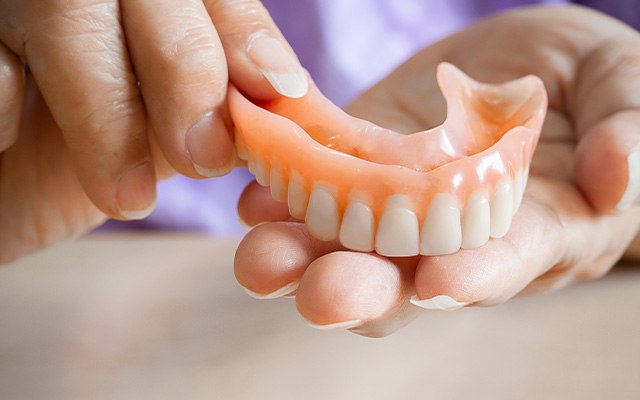
The type of denture you receive is likely to be different than another patient’s, which means you should not expect to pay the same amount. Since each case is unique, we will need to formulate a cost estimate based on various factors that include:
- The number of teeth you have lost
- If you require additional dental treatments to address other oral health concerns (i.e., gum disease, jawbone loss, tooth decay)
- The type of materials used to craft your dentures
- The type of denture you will receive
Are Implant Dentures More Expensive?
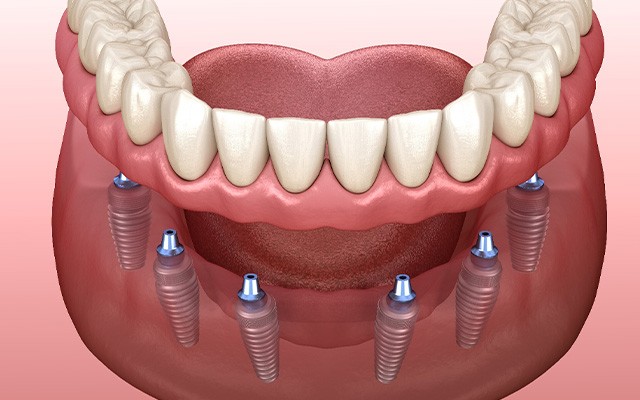
When you think about the differences between traditional and implant dentures, it’s easy to see why more permanent prosthetics are generally more expensive. Surgically placed within the jawbone, these posts can last for a lifetime if you take proper care of them. As a result, the cost of dental implants will be higher but only initially. Over time, they prove to be more cost-effective because they do not need to be replaced as often as regular dentures, and you are not required to purchase additional products to hold them in place or keep them clean.
Does Dental Insurance Cover Dentures?
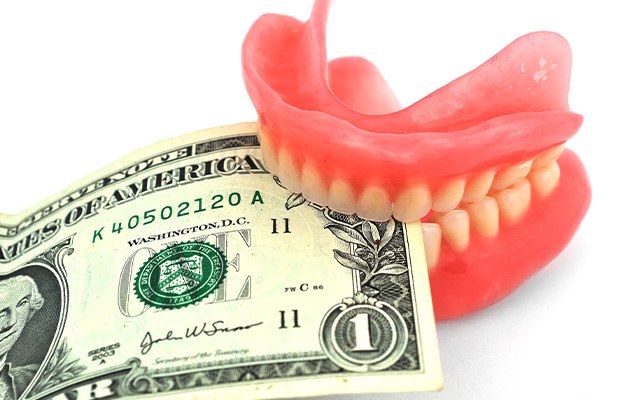
If you have a dental insurance plan, there is a good chance that your insurer will pay a portion of your total bill. Many companies deem dentures a minor or major restorative service and will cover 50-80% of the price. How much they will pay is based on whether you’ve met your deductible and how much of your annual maximum remains. Our team can assist in compiling this information for you so that you can make the right decision about your oral healthcare needs.
Other Options for Making Dentures Affordable

At Chaska Dental Center, we know not everyone has a private dental insurance plan. This is why we also welcome Visa, Mastercard, American Express, and Discover. If you would prefer not to charge your treatment to a credit card, our team is pleased to extend a 5% discount on various services available in-house, although some restrictions do apply.
Dentures Aftercare

Once your dentures are in place, you’ll likely be eager to start enjoying the benefits of your new smile. However, you’ll want to keep in mind all the steps that are necessary to ensure they remain in optimal shape for as long as possible. You may be tempted to disregard normal oral hygiene because of your artificial teeth, but this would be a mistake. Instead, it’s important that you follow the instructions our Chaska Dental Center team provides so that you can enjoy your newly restored smile for years to come.
Removable Dentures

Remove After Eating
It’s important that you remove your dentures after eating, as food debris and bacteria can become trapped between the denture and gumline. You’ll want to brush and rinse them thoroughly to minimize any accumulation, keeping both your prosthetics and gum tissue healthier over time. Just remember not to rinse with hot water, as this can warp your dentures.
Clean Your Restoration
Keeping your dentures clean is essential if you want to avoid bad breath, ill-fitting teeth, and the potential for gum disease. To ensure no bacteria remains, you’ll need to use a soft-bristled toothbrush, mild dish soap, and lukewarm water. Using any kind of toothpaste can scratch the material, as these are often abrasive.
Once you are finished, you’ll find it helpful to allow your dentures to soak overnight for a more thorough cleaning.
Keep Your Dentures Safe
Although dentures are made of durable materials, they’re not immune to damage. This means that you could accidentally damage your new teeth by simply sitting on them, dropping them in the sink, or losing them to a furry friend or on-the-go toddler. It’s best to keep your dentures in a safe place each time you remove them. Place them up high to keep pets and children from reaching them and put a towel in your sink basin so they have a soft area to land on should you accidentally drop them during the cleaning process.
Remove Dentures When You Sleep
Sleeping in your dentures is never a good idea. Although it might seem odd to take them out at night, your prosthetics can benefit from a thorough soaking in denture cleaner. Also, your gums and bones need time to recover after supporting your teeth all day. This time allows them to recoup valuable nutrients as well as rest after enduring continuous pressure.
Another important reason to remove your dentures before going to bed is that failing to do so can cause bacteria to accumulate underneath the prosthetic, putting you at a higher risk of developing pneumonia.
Notice Changes
If you happen to notice that your dentures no longer fit comfortably, make sure to call our dental office right away. It’s normal for these teeth to change over time, especially since the jawbone is not receiving proper stimulation. This causes the area to weaken, which will have an impact on the fit and comfort of your prosthetics. Seeking professional assistance sooner rather than later can reduce the potential for dental damage and oral sores.
Dentures FAQs
What is the average age for dentures?
When it comes to tooth loss, anyone at any age is susceptible; however, to receive dentures, you’ll likely find individuals who are much older wearing these prosthetics. But that doesn’t mean they’re not available to younger adults. In fact, the National Center for Health Statistics states that a majority (around 66%) of individuals who are between 40-64 years of age are missing one tooth.
To wear dentures, all you need is good general oral and overall health and be missing one, multiple, or all of your teeth.
Can I sleep in my dentures?
There is no definite rule that states you can’t sleep in your dentures; however, it is strongly recommended that you do not for many reasons, including:
- Your dentures can soak while you’re asleep, ensuring they receive a thorough cleaning throughout the night.
- Your gums and bone need to breathe after succumbing to much restriction and pressure throughout the day.
- Your gums and bone can receive valuable nutrients that are lost throughout the day.
- It reduces your risk of possible pneumonia.
What can’t you eat with dentures?
Dentures can be a great way to restore your smile’s appearance; however, there are some limitations when it comes to eating certain foods, such as:
- Staying away from sticky foods like caramel, peanut butter, gummy candies, and more. They can pull your dentures out of place, making it difficult to eat.
- Avoiding hard, crunchy foods like popcorn, apples, nuts, and even corn on the cob. Because these kinds of foods can damage your dentures, it’s better to avoid them altogether or cut them up into smaller pieces (if possible).
- Rethinking tough meats like steak because they require a lot of chewing, and your dentures and gums may be unable to successfully wear down the food enough to safely digest. Again, you may need to cut these up into small pieces.
Can I use regular toothpaste to clean my dentures?
Unfortunately, it is not recommended that you use regular toothpaste to clean your dentures. The reason is that many of these products are highly abrasive, which means that your dentures will become scratched and damaged if exposed to these types of toothpaste. Instead, it is recommended that you use a soft-bristled toothbrush and mild hand soap to clean them. There are non-abrasive toothpaste brands on the market, so if you’re interested in one of those, just ask a member of our team.









